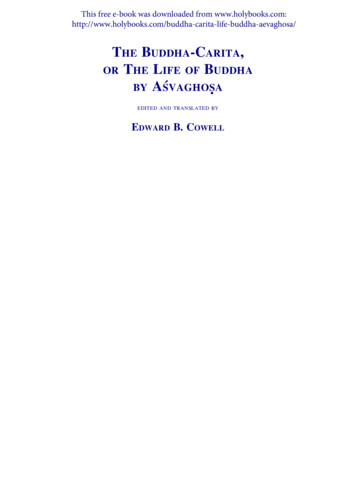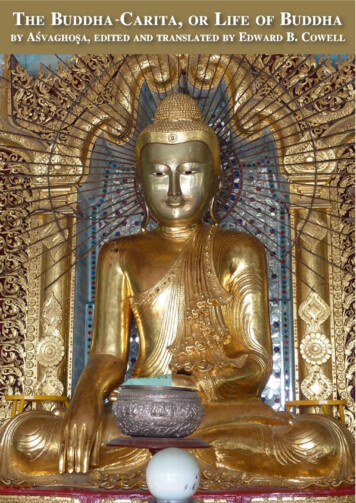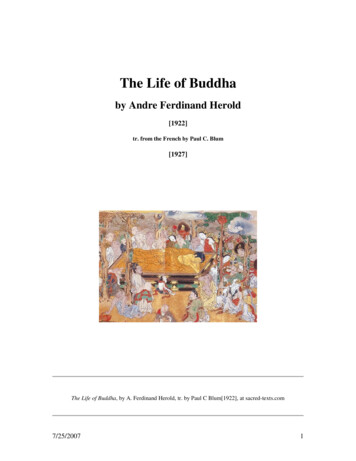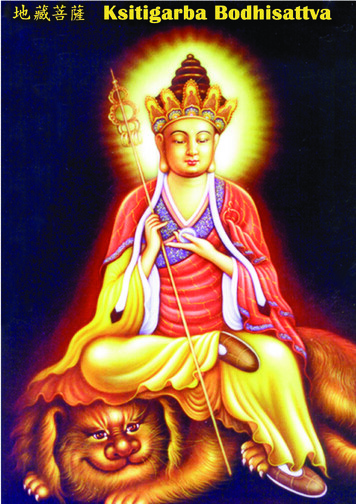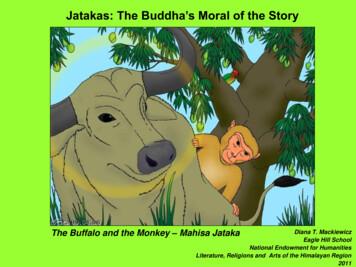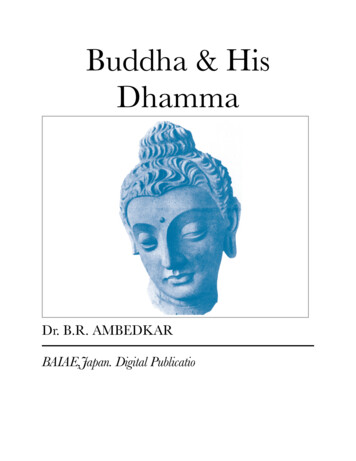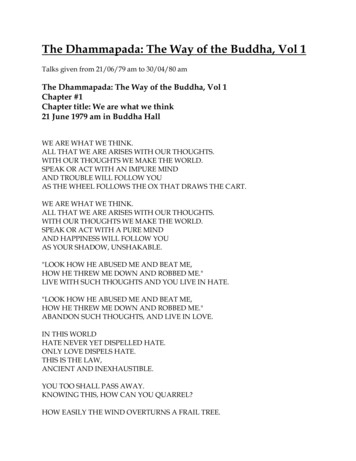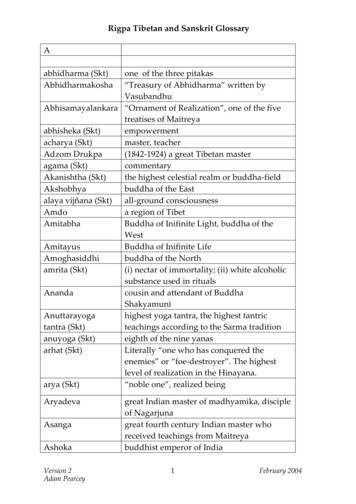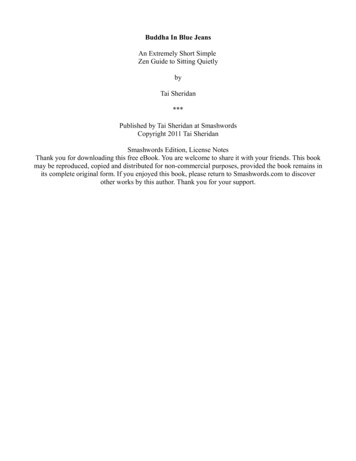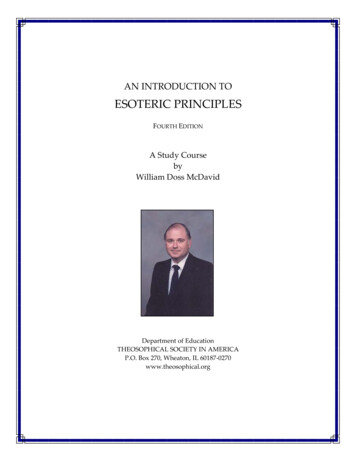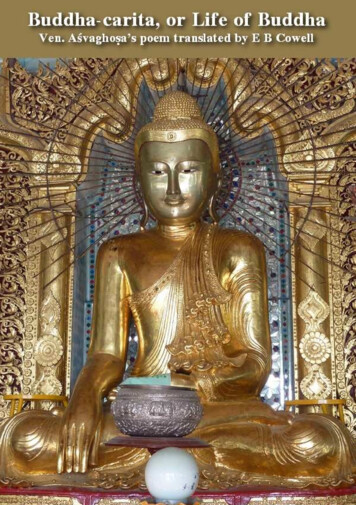
Transcription
Buddha-carita, or Life of Buddha
Buddha-carita, or Life of BuddhaVenerable Aśvaghoṣatranslated by E B Cowell
Table of ContentsIntroduction.3Book I [The Birth of the Holy One].9Book II [Life in the Palace].25Book III [The Prince’s Pertubation].35Book IV [The Women Rejected].46Book V [Flight].59Book VI [The Dismissal of Chaṁdaka].74Book VII [Entry into the Penance Grove].84Book VIII [Lamentations in the Palace].94Book IX [The Deputation to the Prince].109Book X [Śreṇya’s Visit].123Book XI [The Passions Spurned].130Book XII [Visit to Arāḍa].143Book XIII [Defeat of Māra].160Book XIV [Enlightenment].172
The Buddha-cBook XV of The Buddha-cnda.186Book XVI of The Buddha-cBook XVII [The Progress to Lumbinī] of The Buddha-carita
Buddhacarita, or Life of Buddha - 3IntroductionThe Sanskrit text of the Buddha-carita was published at the beginningof last year [i.e 1893] in the ‘Anecdota Oxoniensia,’ and the followingEnglish translation is now included in the series ‘Sacred Books of theEast.’ It is an early Sanskrit poem written in India on the legendaryhistory of Buddha, and therefore contains much that is of interest forthe history of Buddhism, besides its special importance as illustratingthe early history of classical Sanskrit literature.It is ascribed to Aśvaghoṣa; and although there were several writerswho bore that name, it seems most probable that our author was thecontemparary and spiritual advisor of Kaniṣka in the first century ofour era. Hiouen Thsang, who left India in A. D. 645, mentions himwith Deva, Nāgārjuna, and Kumāralabdha, ‘as the four suns whichillumine the world;’1 but our fullest account is given by I-tsing, whovisited India in 673. He states that Aśvaghoṣa was an ancient authorwho composed the Alaṅkāra-śāstra and the Buddha-carita-kāvya, – thelatter work being of course the present poem. Besides these two workshe also composed the hymns in honour of Buddha and the three holybeings Amitābha, Avalokiteśvara, and Mahāsthāma, which werechanted at the evening service of the monasteries. ‘In the fivecountries of India and in the countries of the Southern ocean they1Julien’s translation, vol ii, p. 214.
Buddha-carita, or Life of Buddha - 4recite these poems, because they express a store of ideas and meaning2in a few words.’ A solitary stanza (VIII, 13) is quoted from theBuddha-carita in Rāyamukuṭa’s commentary on the Amarakoṣa I, i. 1,2, and also by Ujjvaladatta in his commentary on the Uṇādi-sūtras I,156; and five stanzas are quoted as from Aśvaghoṣa in Vallabhadeva’sSubhāṣitāvali, which bear a great resemblance to his style, thoughthey are not found in the extant portion of this poem.3The Buddha-carita was translated into Chinese4 by Dharmarakṣa inthe fifth century, and a translation of this was published by the Rev.S. Beal in the present series [of the Sacred Books of the East]; it wasalso translated into Tibetan in the seventh or eighth century. TheTibetan as well as the Chinese version consists of twenty-eighthchapters, and carries down the life of Buddha to his entrance intoNirvāṇa and the subsequent division of the sacred relics. The Tibetanversion appears to be much closer to the original Sanskrit than theChinese; in fact from its verbal accuracy we can often reproduce theexact words of the original, since certain Sanskrit words are alwaysrepresented by the same Tibetan equivalents, as for instance, theprepositions prefixed to verbal roots. I may here express an earnest2See M. Fujishama, Journal Asiatique, 1888, p. 425.3Professor Peterson has remarked that two stanzas out of the five occur in-śataka.4We have for the present classed the Buddha-carita with the MahāyānaSūtras in default of more exact information.
Buddha-carita, or Life of Buddha - 5hope that we may ere long have an edition and translation of theTibetan version, if some scholar can be found to complete Dr.Wendzel’s unfinished labour. He had devoted much time and thoughtto the work; I consulted him in several of my difficulties, and it isfrom him that I derived all my information about the Tibetanrenderings. This Tibetan version promises to be of great help inrestoring the many corrupt readings which still remain in our faultyNepalese MSS.Only thirteen books of the Sanskrit poem claim to be Aśvaghoṣa’scomposition; the last four books are an attempt by a modern Nepaleseauthor to supply the loss of the original. He tells us this honestly inthe colophon, – ‘having searched for them everywhere and not foundthem, four cantos have been made by m– thefourteenth, fifteenth, sixteenth, and seventeenth.’ He adds the date 950of the Nepalese era, corresponding to 1830 a. d.; and we have nodifficulty in idendifying the author. Rājendralāl Mitra in his ‘NepaleseBuddhist Literature’ menSanskrit treatises and one in Newārī; he was probably the father ofthe old paṇḍit of the Residency at Kāṭmāṇḍu, Guṇananda, whose sonIndrānanda holds the office at present. Dr. D. Wright informs me thatthe family seem to have been the recognised historians of the country,and keepers of the MS. treasures of sundray temples. The four booksare included in this translation as an interesting literary curiosity. Thefirst portion of the fourteenth book agrees partly with the Tibetan andChinese, and Am
Buddha-carita, or Life of Buddha - 6copy of this portion of the original; but after that his account is quiteindependent, and has no relation to the two versions.In my preface to the edition of the Sanskrit text I have tried to showthat Aśvaghoṣa’s poem appears to have exercised an importantinfluence on the succeeding poets of the classical period in India.When we compare the descriptions in the seventh book of theRaghuvaṁsa of the ladies of the city crowding to see prince Aja as hepasses by from the Svayaṁvara where the princess Bhojyā has chosenhim as her husband, with the episode in the third book of the Buddhacarita (ślokas 13-24); or the description’s of Kāma’s assault on Śiva inthe Kumārasambhava with that of Māra’s temptation of Buddha in thethirteenth book, we can hardly fail to trace some connection. There isa similar resemblance between the description in the fifth book of theRāmāyaṇa, where the monkey Hanumat enters Rāvaṇa’s palace bynight, and sees his wives asleep in the seraglio and their variousunconscious attitudes, and in the description in the fifth book of thepresent poem where Buddha on the night of his leaving his home forever sees the same unconscious sight in his own palace. Nor may weforget that in the Rāmāyaṇa the description is introduced as anornamental episode; in the Buddhist poem it an essential elelment inthe story, as it supplies the final impulse which stirs the Bodhisattvato make his escape from the world. These different descriptionsbecame afterwards commonplaces in Sanskrit poetry, like thecatalogue of the ships in Greek or Roman epics; but they may verywell have originated in connection with definite incidents in theBuddhist sacred legend.
Buddha-carita, or Life of Buddha - 7The Sanskrit MSS. of Nepal are always negligently transcribed andabound with corrupt passages, which it is often very difficult to detectand restore. My printed text leaves many obscure lines which willhave to be cleared up hereafter by more skilful emendations. I havegiven in the notes to the translation some further emendations of myown, and I have also added several happy conjectures whichcontinental scholars have kindly suggested to me by letter; and Igladly take this opportunity of adding in a foot-note some of which Ireceived too late to insert in their proper places.5I have endeavoured to make my translation intelligible to the Englishreader, but many of the verses in the original are very obscure.Aśvaghoṣa employs all the resources of Hindu rhetoric (as we mightwell expect if I-tsing is right in ascribing to him an ‘alaṅkāra-śāstra’),and it is often difficult to follow his subtil turns of thought andremote allusions; but many passages no doubt owe their presentobscurity to undetected mistakes in the text of our MSS. In theabsence of any commentary (except so far as the diffuse Chinesetranslation and occasional reference to the Tibetan have supplied the5Dr. von Boehtlingk suggests ‘saujā vicacāra’ in VIII, 3, and ‘vilambakeśyo’ inVIII, 21, — two certain emendations. Professor Kielhorn would read‘nabhasy eva’ in XIII, 47 for ‘nayaty eva,’ and ‘tatrai’ inXIII, 50. Professor Bühler would read ‘priyatanayas tanayasya’ in I, 87, and‘na tatyāja ca’ in IV, 80.
Buddha-carita, or Life of Buddha - 8want) I have necessarily been left to my own resources, and I cannotfail to have sometimes missed my author’s meaning.Prāṁśulabhye phale mohād udbāhur iva vāmanaḥ;but I have tried to do my best, and no one will welcome morecordially any light which others may throw on the passages I havemisunderstood.The edition of the original text was dedicated to my old friendProfessor F. Max Müller, and it is sincere gratification to me that thistranslation will appear in the same volume with similar translationsfrom his pen.E. B. C.Cambridge:Feb 1, 1894.
Buddha-carita, or Life of Buddha - 9Book I [The Birth of the Holy One]1. That Arhat is here saluted, who has no counterpart, – who, asbestowing the supreme happiness, surpasses (Brahman) the Creator, –who, as driving away darkness, vanquishes the sun, – and, asdispelling all burning heat, surpasses the beautiful moon.2. There was a city, the dwelling-place of the great saint Kapila,having its sides surrounded by the beauty of a lofty broad table-landas by a line of clouds, and itself, with its high-soaring palaces,immersed in the sky.3. By its pure and lofty system of government it, as it were, stole thesplendour of the clouds of Mount Kailāsa, and while it bore the cloudswhich came to it through a mistake, it fulfilled the imagination whichhad led them thither.4. In that city, shining with the splendour of gems, darkness likepoverty could find no place; prosperity shone resplendently, as with asmile, from the joy of dwelling with such surpassingly excellentcitizens.5. With its festive arbours, its arched gateways and pinnacles, it wasradiant with jewels in every dwelling; and unable to find any otherrival in the world, it could only feel emulation with its own houses.6. There the sun, even although he had retired, was unable to scornthe moon-like faces of its women which put the lotuses to shame, and
Buddha-carita, or Life of Buddha - 10as if from the access of passion, hurried towards the western ocean toenter the (cooling) water.7. ‘Yonder Indra has been utterly annihilated by the people when theysaw the glories acquired by the Sakyas,’-uttering this scoff, the citystrove by its banners with gay-fluttering streamers to wipe away everymark of his existence.8. After mocking the water-lilies even at night by the moonbeamswhich rest on its silver pavilions, – by day it assumed the brightnessof the lotuses through the sunbeams falling on its golden palaces.9. A king, by name Śuddhodana, of the kindred of the sun, anointedto stand at the head of earths monarchs, – ruling over the city,adorned it, as a bee-inmate a full-blown lotus.10. The very best of kings with his train ever near him, – intent onliberality yet devoid of pride; a sovereign, yet with an ever equal eyethrown on all, – of gentle nature and yet with wide-reaching majesty.11. Falling smitten by his arm in the arena of battle, the lordlyelephants of his enemies bowed prostrate with their heads pouringforth quantities of pearls as if they were offering handfuls of flowersin homage.12. Having dispersed his enemies by his preeminent majesty as the sundisperses the gloom of an eclipse, he illuminated his people on everyside, showing them the paths which they were to follow.
Buddha-carita, or Life of Buddha - 1113. Duty, wealth, and pleasure under his guidance assumed mutuallyeach other’s object, but not the outward dress; yet as if they still viedtogether they shone all the brighter in the glorious career of theirtriumphant success.14. He, the monarch of the Śākyas, of native pre-eminence, but whoseactual pre-eminence was brought about by his numberless councillorsof exalted wisdom, shone forth all the more gloriously, like the moonamidst the stars shining with a light like its own.15. To him there was a queen, named Māyā, as if free from all deceit(māyā) – an effulgence proceeding from his effulgence, like thesplendour of the sun when it is free from all the influence ofdarkness, a chief queen in the united assembly of all queens.16. Like a mother to her subjects, intent on their welfare, – devoted toall worthy of reverence like devotion itself, – shining on her lord’sfamily like the goddess of prosperity, – she was the most eminent ofgoddesses to the whole world.17. Verily the life of women is always darkness, yet when itencountered her, it shone brilliantly; thus the night does not retain itsgloom, when it meets with the radiant crescent of the moon.18. ‘This people, being hard to be roused to wonder in their souls,cannot be influenced by me if I come to them as beyond their senses,’- so saying, Duty abandoned her own subtile nature and made herform visible.
Buddha-carita, or Life of Buddha - 1219. Then falling from the host of beings in the Tuṣita heaven, andillumining the three worlds, the most excellent of Bodhisattvassuddenly entered at a thought into her womb, like the Nāga-kingentering the cave of Nandā.20. Assuming the form of a huge elephant white like Himālaya, armedwith six tusks, with his face perfumed with flowing ichor, he enteredthe womb of the queen of king Śuddhodana, to destroy the evils ofthe world.21. The guardians of the world hastened from heaven to mount watchover the world’s one true ruler; thus the moonbeams, though theyshine everywhere, are especially bright on Mount Kailāsa.22. Māyā also, holding him in her womb, like a line of clouds holdinga lightning-flash, relieved the people around her from the sufferingsof poverty by raining showers of gifts.23. Then one day by the king’s permission the queen, having a greatlonging in her mind, went with the inmates of the gynaeceum into thegarden Lumbinī.24. As the queen supported herself by a bough which hung laden witha weight of flowers, the Bodhisattva suddenly came forth, cleavingopen her womb.
Buddha-carita, or Life of Buddha - 1325. At that time the constellation Puṣya was auspicious, and from theside of the queen, who was purified by her vow, her son was born forthe welfare of the world, without pain and without illness.26. Like the sun bursting from a cloud in the morning, – so he too,when he was born from his mother’s womb, made the world brightlike gold, bursting forth with his rays which dispelled the darkness.27. As soon as he was born the thousand-eyed (Indra) well-pleasedtook him gently, bright like a golden pillar; and two pure streams ofwater fell down from heaven upon his head with piles of Mandāraflowers.28. Carried about by the chief suras, and delighting them with therays that streamed from his body, he surpassed in beauty the newmoon as it rests on a mass of evening clouds.d,Kakṣīvat’s from the upper end of the arm, – thus too was his birth(miraculous).30. Having thus in due time issued from the womb, he shone as if hehad come down from heaven, he who had not been born in thenatural way, – he who was born full of wisdom, not foolish, as if hismind had been purified by countless aeons of contemplation.
Buddha-carita, or Life of Buddha - 1431. With glory, fortitude, and beauty he shone like the young sundescended upon the earth; when he was gazed at, though of suchsurpassing brightness, he attracted all eyes like the moon.32. With the radiant splendour of his limbs he extinguished like thesun the splendour of the lamps; with his beautiful hue as of preciousgold he illuminated all the quarters of space.33. Unflurried, with the lotus-sign in high relief, far-striding, setdown with a stamp, – seven such firm footsteps did he then take, – he34. ‘I am born for supreme knowledge, for the welfare of the world, –thus this is my last birth,’ thus did he of lion gait, gazing at the fourquarters, utter a voice full of auspicious meaning.35. Two streams of water bursting from heaven, bright as the moon’srays, having the power of heat and cold, fell down upon that peerlessone’s benign head to give refreshment to his body.36. His body lay on a bed with a royal canopy and a frame shiningwith gold, and supported by feet of lapis lazuli, and in his honour theyakṣa-lords stood round guarding him with golden lotuses in theirhands.37. The gods in homage to the son of Māyā, with their heads bowed athis majesty, held up a white umbrella in the sky and muttered thehighest blessings on his supreme wisdom.
Buddha-carita, or Life of Buddha - 1538. The great dragons in their great thirst for the Law, – they whohad had the privilege of waiting on the past Buddhas, – gazing witheyes of intent devotion, fanned him and strewed Mandāra flowersover him.39. Gladdened through the influence of the birth of the Tathāgata, thegods of pure natures and inhabiting pure abodes were filled with joy,though all passion was extinguished, for the sake of the worlddrowned in sorrow.40. When he was born, the earth, though fastened down by(Himālaya) the monarch of mountains, shook like a ship tossed by thewind; and from a cloudless sky there fell a shower full of lotuses andwater-lilies, and perfumed with sandalwood.41. Pleasant breezes blew soft to the touch, dropping down heavenlygarments; the very sun, though still the same, shone with augmentedlight, and fire gleamed, unstirred, with a gentle lustre.42. In the north-eastern part of the dwelling a well of pure waterappeared of its own accord, wherein the inhabitants of thegynaeceum, filled with wonder, performed their rites as in a sacredbathing-place.43. Through the troops of heavenly visitants, who came seekingreligious merit, the pool itself received strength to behold Buddha,and by means of its trees bearing flowers and perfumes it eagerlyoffered him worship.
Buddha-carita, or Life of Buddha - 1644. The flowering trees at once produced their blossoms, while theirfragrance was borne aloft in all directions by the wind, accompaniedby the songs of bewildered female bees, while the air was inhaled andabsorbed by the many snakes (gathering near).45. Sometimes there resounded on both sides songs mingled withmusical instruments and tabours, and lutes also, drums, tambourines,and the rest, from women adorned with dancing bracelets.thosetwo great seers the founders of families, their two sons Śukra and47. ‘Yea, the son of Sarasvatī I proclaimed that lost Veda which theyhad never seen in former ages, – Vyāsa rehearsed that in many forms,which Vaśiṣṭha helpless could not compile;48. ‘The voice of Vālmīki uttered its poetry which the great seerCyavana could not compose; and that medicine which Atri neverinvented the wise son of Atri proclaimed after him;49. ‘That Brahmanhood which Kuśika never attained, – his son, Oking, found out the means to gain it; (so) Sagara made a bound forthe ocean, which even the Ikṣvākus had not fixed before him.50. ‘Janaka attained a power of instructing the twice-born in the rulesof Yoga which none other had ever reached; and the famed feats of
Buddha-carita, or Life of Buddha - 17the grandson of Śūra (Kriṣṇa) Śūra and his peers were powerless toaccomplish.51. ‘Therefore it is not age nor years which are the criterion; differentpersons win pre-eminence in the world at different places; thosemighty exploits worthy of kings and sages, when left undone by theancestors, have been done by the sons.’52. The king, being thus consoled and congratulated by those welltrusted Brāhmans, dismissed from his mind all unwelcome suspicionand rose to a still higher degree of joy;53. And well-pleased he gave to those most excellent of the twice-bornrich treasures with all due honour, – ‘May he become the ruler of theearth according to your words, and may he retire to the woods whenhe attains old age.’54. Then having learned by signs and through the power of hispenances this birth of him who was to destroy all birth, the great seerAsita in his thirst for the excellent Law came to the palace of theŚākya king.55. Him shining with the glory of sacred knowledge and asceticobservances, the king’s own priest, – himself a special student amongthe students of sacred knowledge, – introduced into the royal palacewith all due reverence and respect.
Buddha-carita, or Life of Buddha - 1856. He entered into the precincts of the king’s gynaeceum, which wasall astir with the joy arisen from the birth of the young prince, –grave from his consciousness of power, his pre-eminence inasceticism, and the weight of old age.57. Then the king, having duly honoured the sage, who was seated inhis seat, with water for the feet and an arghya offering, invited him(to speak) with all ceremonies of respect, as did Antideva in oldentime to Vaśiṣṭha:58. ‘I am indeed fortunate, this my family is the object of high favour,that thou shouldst have come to visit me; be pleased to command whatI should do, O benign one; I am thy disciple, be pleased to show thyconfidence in me.’59. The sage, being thus invited by the king, filled with intense feelingas was due, uttered his deep and solemn words, having his large eyesopened wide with wonder:60. ‘This is indeed worthy of thee, great-souled as thou art, fond ofguests, liberal and a lover of duty, – that thy mind should be thus kindtowards me, in full accordance with thy nature, family, wisdom, andage.61. ‘This is the true way in which those seer kings of old, rejectingthrough duty all trivial riches, have ever flung them away as wasright, – being poor in outward substance but rich in ascetic endurance.
Buddha-carita, or Life of Buddha - 1962. ‘But hear now the motive for my coming and rejoice thereat; aheavenly voice has been heard by me in the heavenly path, that thyson has been born for the sake of supreme knowledge.63. ‘Having heard that voice and applied my mind thereto, and havingknown its truth by signs, I am now come hither, with a longing to seethe banner of the Śākya race, as if it were Indra’s banner being setup.’64. Having heard this address of his, the king, with his stepsbewildered with joy, took the prince, who lay on his nurse’s side, andshowed him to the holy ascetic.65. Thus the great seer beheld the king’s son with wonder, – his footmarked with a wheel, his fingers and toes webbed, with a circle ofhair between his eyebrows, and signs of vigour like an elephant.66. Having beheld him seated on his nurse’s side, like the son of Agni(Skanda) seated on Devī’s side, he stood with the tears hanging on theends of his eyelashes, and sighing he looked up towards heaven.67. But seeing Asita with his eyes thus filled with tears, the king wasagitated through his love for his son, and with his hands clasped andhis body bowed he thus asked him in a broken voice choked withweeping,68. ‘One whose beauty has little to distinguish it from that of a divinesage, and whose brilliant birth has been so wonderful, and for whom
Buddha-carita, or Life of Buddha - 20thou hast prophesied a transcendent future, – wherefore, on seeinghim, do tears come to thee, O reverend one?69. ‘Is the prince, O holy man, destined to a long life? Surely hecannot be born for my sorrow. I have with difficulty obtained ahandful of water, surely it is not death which comes to drink it.70. ‘Tell me, is the hoard of my fame free from destruction? Is thischief prize of my family secure ? Shall I ever depart happily toanother life, – I who keep one eye ever awake, even when my son isasleep?71. ‘Surely this young shoot of my family is not born barren, destinedonly to wither! Speak quickly, my lord, I cannot wait; thou wellknowest the love of near kindred for a son.’72. Knowing the king to be thus agitated through his fear of someimpending evil, the sage thus addressed him: ‘Let not thy mind, Omonarch, be disturbed, – all that I have said is certainly true.73. ‘I have no feeling of fear as to his being subject to change, but Iam distressed for mine own disappointment. It is my time to depart,and this child is now born, – he who knows that mystery hard toattain, the means of destroying birth.74. Having forsaken his kingdom, indifferent to all worldly objects,and having attained the highest truth by strenuous efforts, he will
Buddha-carita, or Life of Buddha - 21shine forth as a sun of knowledge to destroy the darkness of illusionin the world.75. ‘He will deliver by the boat of knowledge the distressed world,borne helplessly along, from the ocean of misery which throws upsickness as its foam, tossing with the waves of old age, and rushingwith the dreadful onflow of death.76. ‘The thirsty world of living beings will drink the flowing streamof his Law, bursting forth with the water of wisdom, enclosed by thebanks of strong moral rules, delightfully cool with contemplation, andfilled with religious vows as with ruddy geese.77. ‘He will proclaim the way of deliverance to those afflicted withsorrow, entangled in objects of sense, and lost in the forest-paths ofworldly existence, as to travellers who have lost their way.78. ‘By the rain of the Law he will give gladness to the multitude whoare consumed in this world with that fire of desire whose fuel isworldly objects, as a great cloud does with its showers at the end ofthe hot season.79. ‘He will break open for the escape of living beings that doorwhose bolt is desire and whose two leaves are ignorance and delusion,– with that excellent blow of the good Law which is so hard to find.80. ‘He, the king of the Law, when he has attained to supremeknowledge, will achieve the deliverance from its bonds of the world
Buddha-carita, or Life of Buddha - 22now overcome by misery, destitute of every refuge, and enveloped inits own chains of delusion.81. ‘Therefore make no sorrow for him, – that belongs rather, kindsire, to the pitiable world of human beings, who through illusion orthe pleasures of desire or intoxication refuse to hear his perfect Law.82. ‘Therefore since I have fallen short of that excellence, though Ihave accomplished all the stages of contemplation, my life is only afailure; since I have not heard his Law, I count even dwelling in thehighest heaven a misfortune.’83. Having heard these words, the king with his queen and his friendsabandoned sorrow and rejoiced; thinking, ‘such is this son of mine,’ heconsidered that his excellence was his own.84. But he let his heart be influenced by the thought, ‘he will travel bythe noble path,’ – he was not in truth averse to religion, yet still hesaw alarm at the prospect of losing his child.85. Then the sage Asita, having made known the real fate whichawaited the prince to the king who was thus disturbed about his son,departed by the way of the wind as he had come, his figure watchedreverentially in his flight.86. Having taken his resolution and having seen the son of hisyounger sister, the saint, filled with compassion, enjoined him
Buddha-carita, or Life of Buddha - 23earnestly in all kinds of ways, as if he were his son, to listen to thesage’s words and ponder over them.87. The monarch also, being well-pleased at the birth of a son, havingthrown off all those bonds called worldly objects, caused his son to gothrough the usual birth-ceremonies in a manner worthy of the family.88. When ten days were fulfilled after his son’s birth, with histhoughts kept under restraint, and filled with excessive joy, he offeredfor his son most elaborate sacrifices to the gods with mutteredprayers, oblations, and all kinds of auspicious ceremonies.89. And he himself gave to the Brāhmans for his son’s welfare cowsfull of milk, with no traces of infirmity, golden-horned and withstrong healthy calves, to the full number of a hundred thousand.90. Then he, with his soul under strict restraint, having performed allkinds of ceremonies which rejoiced his heart, on a fortunate day, inan auspicious moment, gladly determined to enter his city.91. Then the queen with her babe having worshipped the gods forgood fortune, occupied a costly palanquin made of elephants’ tusks,filled with all kinds of white flowers, and blazing with gems.92. Having made his wife with her child enter first into the city,accompanied by the aged attendants, the king himself also advanced,saluted by the hosts of the citizens, as Indra entering heaven, salutedby the immortals.
Buddha-carita, or Life of Buddha - 2493. The Śākya king, having entered his palace, like Bhava wellpleased at the birth of Kārttikeya, with his face full of joy, gaveorders for lavish expenditure, showing all kinds of honour andliberality.94. Thus at the good fortune of the birth of the king’s son, that citysurnamed after Kapila, with all the surrounding inhabitants, was fullof gladness like the city of the lord of wealth, crowded with heavenlynymphs, at the birth of his son Nalakūvara.[Such is the first chapter in the great poem Śri Buddhacarita,called The Birth of the Holy One]
Buddha-carita, or Life of Buddha - 25Book II [Life in the Palace]1. From the time of the birth of that son of his, who, the true masterof himself, was to end all birth and old age, the king increased day byday in wealth, elephants, horses, and friends as a river increases withits influx of waters.2. Of different kinds of wealth and jewels, and of gold, wrought orunwrought, he found treasures of manifold variety, surpassing eventhe capacity of his desires.3. Elephants from Himavat, raging with rut, whom not even princesof elephants like Padma could teach to go round in circles, camewithout any effort and waited on him.4. His city was all astir with the crowds of horses, some adorned withvarious marks and decked with new golden trappings, othersunadorned and with long
Buddhacarita, or Life of Buddha - 3 Introduction The Sanskrit text of the Buddha-carita was published at the beginning of last year [i.e 1893] in the 'Anecdota Oxoniensia,' and the following English translation is now included in the series 'Sacred Books of the East.' It is an early Sanskrit poem written in India on the legendary
